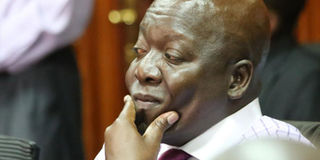Lessons for Kenyan MPs from India’s betting rules

National Assembly Deputy Minority leader Jakoyo Midiwo. PHOTO | BILLY MUTAI |
What you need to know:
- In India most of the sporting love is reserved for cricket.
- Four years ago, India’s local cricket league was rocked by a major match-fixing scandal driven mainly by illegal betting.
- Bookmakers were accused of bribing some players to influence certain aspects of select matches.
In Kenya, and in much of Africa, football is a cherished sport. From the huge following that European leagues enjoy here to the growing popularity of local teams, there is little doubt that the masses enjoy football matters.
However, in India most of the sporting love is reserved for cricket. Its players are some of the country’s greatest celebrities and heroes. However, in 2013 a major scandal erupted in India’s cricket circles, one whose ripple effects are felt until today as debate rages on.
This was on whether or not to legalise sports betting.
Four years ago, India’s local cricket league was rocked by a major match-fixing scandal driven mainly by illegal betting. The saga exposed the roles played by key officials of the cricket league, some players and unlicensed bookmakers in fixing matches to drive the underground betting business that thrives in India.
Following this expose, several bookmakers (who had set up betting shops in residential areas), players, relatives of some officials of India’s cricket governing body were arrested.
Bookmakers were accused of bribing some players to influence certain aspects of select matches. This fuelled the debate on whether or not to legalise sports betting.
In the middle of this debate is an outdated Public Gaming Act of 1867 which made betting illegal but leaves a loophole that has allowed Indians to place bets online as this is not expressly prohibited under the law.
As a result, foreign firms have cashed in on the loophole by making their platforms accessible to gamblers in India.
At the height of the debate last year, India’s Supreme Court asked the country’s Congress to legalise sports betting “to make it easy to monitor and weed out cartels engaging in match fixing.”
A committee to look into the matter, led by India’s former chief justice R.M. Lodha, recommended sports betting legalisation noting that unofficially, it was big business that could not be ignored.
A ban on betting, the committee argued, would drive it underground.
Now, looking at this scenario vis-a-vis some of the proposals in the Betting, Lotteries and Gaming (Amendment) Bill 2016 sponsored by Gem MP Jakoyo Midiwo, one is left wondering whether there has been any consideration in balancing the regulation to serve the industry, society and the economy.
Betting may be legal in Kenya, but some of the proposals are too punitive for any formal betting company to survive.
For instance, excess taxation, limiting betting to age 25 and above and directing that betting firms only retain five per cent of their income for paying costs while 30 per cent goes to winners and 65 per cent to charities and sponsorships would kill the industry.
As the Parliamentary Committee on Labour and Social Welfare deliberates on this matter, perhaps they should study the India case first if they are to make informed decisions.
The writer comments on topical issues. [email protected]




